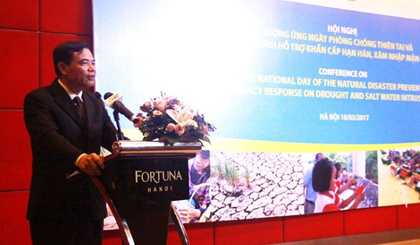Further investment needed to reduce children's vulnerability to impacts of climate change
About 200 officials and experts from the Vietnamese Government, UNICEF and other international partners gathered in Ha Noi on May 18 to celebrate the Vietnam National Day of Disaster Prevention and Control (May 22) and to discuss future cooperation to reduce children’s vulnerabilities to climate change effects.
 |
| Minister of Agriculture and Rural Development Nguyen Xuan Cuong speaks at the conference. |
Addressing the event, Nguyen Xuan Cuong, Minister of Agriculture and Rural Development and Head of Central Steering Committee for Natural Disaster Prevention and Control, said that powerful and complex natural disasters have occurred frequently and on a large scale in Vietnam in recent years, causing great losses in human, economic and infrastructure terms.
The situation has serious impacts on people’s lives and production activities as well as on the country’s sustainable development, he added.
According to a report by the Central Steering Committee for Natural Disaster Prevention and Control, in 2016 alone 264 people were killed and missing, 431 injured and VND39.726 billion (US$1.7 billion) lost due to natural disasters.
Children bear the brunt of climate change, UNICEF Representative in Vietnam Youssouf Abdel-Jelil said, highlighting the need for further investment so that a natural disaster doesn’t become a catastrophe in the life of a child.
He noted that climate change not only exposes children to greater dangers from malnutrition and diarrhoea, but also to higher risks of being victims of abuse or missing critical years of education. The physical dangers of extreme weather events – flooding, droughts and more – pose unique threats to young bodies and minds during critical years of their development and the consequences can be irreversible, Abdel-Jelil emphasised.
Child-centred disaster risk reduction brings the focus on climate change to and it bridges humanitarian and development work by strengthening the resilience of children, families and communities before a crisis, including through preparedness, disaster risk reduction and climate change adaptation.
At the conference, participants reviewed the achievements attained and lessons learnt from the UNICEF-supported emergency response to the drought and salt water intrusion, rolled out in 2016 in 10 of the most affected provinces in the country.
They also shared experiences and discussed future cooperation in child-centred disaster risk reduction in Vietnam. Building on the first National Conference on Child-Centred Disaster Risk Reduction held in Ninh Thuan province in December 2016, this conference continued strengthening the partnership within the Law on Disaster Prevention and Control, the Sendai Framework and Sustainable Development Goals (SDGs).
The conference concluded by endorsing the future orientations of the Government of Vietnam and UNICEF’s cooperation with a focus on child-centred disaster risk reduction and risk-informed programming, and called for strengthen resilience in communities, schools and health facilities, and to draw on good practices, including those from Japan.
UNICEF has been designated as the lead agency on disaster risk reduction within the United Nations system in Vietnam. Since August 2016, UNICEF and the Government of Vietnam have provided emergency relief to more than half a million children and women affected by the drought and salt water intrusion crisis in 10 provinces in Vietnam’s Central Highlands, South Central Coast and Mekong Delta regions, with a financial contribution of US$2.5 million from Government of Japan and US$1.5 million from the UN Central Emergency Relief Fund.
(Source: NDO)
 về đầu trang
về đầu trang






